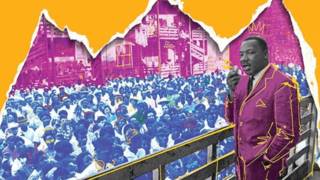
Topics
By AMY GOODMAN
GUEST COLUMNIST
The blood still stains the concrete balcony outside room 306 of the Lorraine Motel in Memphis, Tenn., where the Rev. Martin Luther King Jr. was assassinated on April 4, 1968. King was in Memphis supporting black sanitation workers striking for a union contract.
This past weekend, I came to Memphis for the National Conference on Media Reform but went directly from the airport to this sacred ground.
King is typically remembered for his pioneering civil-rights work and his commitment to non-violent social change, immortalized in his “I Have a Dream” speech at the 1963 March on Washington, D.C. Even as he stood with President Johnson as he signed the Civil Rights Act of 1964 and the Voting Rights Act in 1965, King was moving on.
The central issues that drove King in his final years were war and the poor.
On April 4, 1967, exactly one year before he was gunned down, King gave his watershed “Beyond Vietnam” address at the Riverside Church in New York:
“A few years ago there was a shining moment. It seemed as if there was a real promise of hope for the poor, both black and white, through the poverty program. Then came the buildup in Vietnam, and I watched this program broken and eviscerated. So I was increasingly compelled to see the war as an enemy of the poor.”
He went on, “I am convinced that if we are to get on the right side of the world revolution, we as a nation must undergo a radical revolution of values.”
The speech charted the course for King’s final year. He broadened the scope of his work, opposing the war and promoting a new, broad-based Poor People’s Campaign at home.
He also broadened his roster of enemies.
FBI wiretaps continued. J. Edgar Hoover described the Nobel Peace Prize winner as “an instrument in the hands of subversive forces.” He was investigated by the Internal Revenue Service. Within the movement, he battled a rising, younger generation of militants who did not subscribe to his philosophy of non-violence. Mainstream newspapers editorialized against him.
At Ebenezer Baptist Church in Atlanta on April 30, 1967, King included the press in his critique: “I knew that I could never again raise my voice against the violence of the oppressed in the ghettos without having first spoken clearly to the greatest purveyor of violence in the world today — my own government. There is something strangely inconsistent about a nation and a press that would praise you when you say, 'Be non-violent toward (Sheriff) Jim Clark,' but will curse and damn you when you say, 'Be non-violent toward little brown Vietnamese children!' There is something wrong with that press.”
Actor and activist Danny Glover was in Memphis this past weekend as well, advocating media reform. In November 2001, after Glover criticized the Bush administration’s use of military tribunals, the city of Modesto, Calif., almost uninvited him from its commemoration of Martin Luther King Jr. Day 2002. Glover wondered then: If King had lived, would he have been welcome at his own birthday celebration?
Memphis is still poor. It has one of the highest infant mortality rates in the U.S. We are a nation in a protracted war that is increasingly and aptly compared with Vietnam. To best honor King, consider the words of Judge D’Army Bailey, the founder of the National Civil Rights Museum, which is built around the Lorraine Motel: “This is not a day for ceremony. It ought to be a day for action.”
As we move from our celebration of King’s birthday to Black History Month, we should collectively remember the fundamental struggles King waged against racism, poverty and militarism. That’s what he lived for, that’s what he died for. Instead of the eight-second “I have a dream” sound bite, we should make that dream a reality.
© 2006 Amy Goodman and Denis Moynihan
Amy Goodman hosts the radio news program “Democracy Now!” Distributed by King Features Syndicate.










